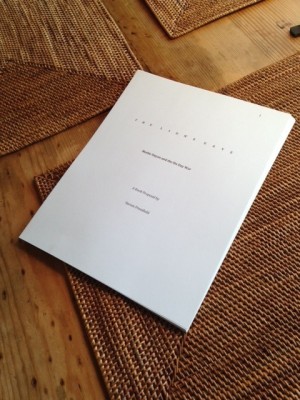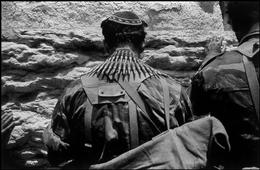The Western Wall, Part One

[“The Book I’ve Been Avoiding Writing” (a.k.a. “Three Years of Writing and 40+ Years of Thinking About The Lion’s Gate“) is a mini-series about the writing of my new book, The Lion’s Gate. Thanks for tuning in as it runs Mondays and Fridays over the next few weeks.]
Day Nine in Israel. Danny is taking me to the Kotel—the Western Wall.
I had to write a Book Proposal for The Lion’s Gate. I had never done that before. Shawn Coyne was operating as my agent on this project. Shawn is my partner in our little publishing venture, Black Irish Books. But The Lion’s Gate is much too big for Black Irish.
We need a major-league mainstream publisher for this one.
Fortunately Shawn, among his many other literary careers, has worked as an agent, most recently for Endeavor, a big-time outfit with a heavy presence in movies and TV as well as books.
Shawn walks me through the book proposal. He has put together hundreds of them over his previous 20 years in the lit biz as an editor and publisher.

The book proposal for "The Lion's Gate."
“A book proposal is like a pitch in Hollywood, only it’s in written form, not verbal. Fifty to sixty pages. You lay out your vision for the book, including a couple of sample chapters, and explain what the target audience is and why this book will appeal to that audience.”
The point of a book proposal is to sell the book to a publisher before you’ve written it. The reason I’d never done a book proposal is that I’ve always written novels. There’s no such thing as a book proposal for a work of fiction. Fiction is too quirky, too execution-dependent. For a novel, publishers want to see the completed manuscript. Only then can they get a sense of go or no-go.
Non-fiction is different. If you’re David McCullough or Bob Woodward, you have credibility in publishers’ eyes before you’ve written a word. They know you can deliver. You can make a deal based on your reputation and a credible book proposal.
The point of a proposal, from the writer’s side, is to get a publisher to advance you money so you can write your book. But a strong, well-thought-out proposal helps the publisher too. It gives her confidence that you, the writer, can deliver what you’ve promised, that it’ll work as a book, and that readers will buy it.
In a way, the book proposal is the kavanah.
It’s the Writer’s Intention. It’s a document that lays out what he’s aiming to do.
Danny and I are approaching the Western Wall. We’ve parked my rental Toyota, jamming it between a Honda Odyssey with Palestinian plates and two motorcycles, a Ducati 250 and a battered English Triumph, parked sideways on the road that rings the monumental fortress walls of the Old City of Jerusalem.
You enter the Old City by various ancient gates—the Jaffa Gate, the Damascus Gate, Herod’s Gate, the Lion’s Gate. The closest to the Western Wall is the Dung Gate, so named because in the days of King David, this was the gate (the lowest of all in elevation) out of which Jerusalemites dumped their garbage.
We pass a knot of Israeli girl soldiers, good-looking nineteen-year-olds with ponytails, baggy fatigue trousers, and M-4 carbines slung muzzle-down over their shoulders. There is nothing remotely intimidating about them. They are on their iPhones, paying attention to no one. Right behind the girl soldiers is a sidewalk bagel seller, an Arab, making a sale to a couple speaking German. Arab bagels are much bigger than Jewish bagels. They look like neck pillows from an airplane. You dip ’em in salt or spices. Three shekels. Seventy-five cents. They’re great.
The Western Wall—the Kotel—was the heart of my Book Proposal. I’ll get into that in detail later. The short version is that the liberation of the Kotel by Israeli paratroopers will be the emotional climax of The Lion’s Gate.

Israeli paratroopers praying before the Western Wall, 7 June 1967. Photo by Micha Bar-Am.
Everything in the book will build to that moment, which even to me, ignorant as I am of the Books of Judges and of Kings, is and can be nothing other than the culminating symbolic moment of all Jewish history, or at least since the legions of Rome burned Jerusalem in 70 BCE, razed the Temple, and drove the Jewish people from the holy land, dispersing them into a two thousand year exile from their homeland and their holiest site.
I am a Diaspora Jew. My name, Pressfield, has been Anglicized from its German antecedent, Pretzfeld. But even that is not a Jewish name. It’s a pass-for-white name, a faux-Gentile name, an assimilative name.




Well, this post has two parts, doesn’t it?
First, the informative discussion about proposals, non-fiction publishing vs. publishing fiction, and the presence of small, independent presses like Black Irish. The explosion of self (independent) publishing and ebooks is mainly, if I’m reading correctly, in fiction, and genre fiction at that. Which makes sense, because the kind of research and authority needed to do credible non-fiction often needs more resources than the individual can supply. There are exceptions. Not just the War of Art type book. But even scholars need to do proposals. Novelists, as you know, need to do a synopsis for the agent.
So I think the first part of this entry informs us about the varieties and diversity of publishing.
The second part. Ah, the second part. Having been to Israel, I can picture exactly what you’re describing. Interesting that you’re also holding back the emotional impact in this post. But one does not approach the center of a book, or the Western Wall, without the right kavanah. And that requires a bit of artistic distancing, self-examination, and observation – just what you do here.
(By the way, the Romans destroyed Jerusalem and the Second Temple in 70 CE. The First Temple was destroyed by the Babylonians destroyed the First Temple in 586 BCE.)
You left me having…it’s a 3 part post…
This is a great read. In a way, it’s a story…about a story… about a story. For writers, and those affected by Israel’s kavanah, claiming the wall and all that it means after 2,000 years, it has great immediacy. It does make me wonder if you are spending ammunition, or if this is necessary decompression after the work of “Lion’s Gate,” or if this is a critical sorting for Pretzfeld.
Looking forward to Parts Two and Three.
Steve, you’re one of the most qualified to write excellent history and fiction. British historian and novelist Simon Sebag Montefiore writes with great versatility. I read Timothy Snyder’s Bloodlands before starting Lion’s Gate and thought it impossible to really understand Israel without fully comprehending the mass genocide of Hitler and Stalin. Estimates of death in the land between Hitler and Stalin range between 14 and 20 million. Stalin originally supported Israel, intending Israel to become a Soviet satellite. There was even discussion of Crimea becoming a Soviet Jewish state. Timothy Snyder makes many references in Bloodlands to the great Russian Jewish writer and novelist Vasily Grossman and the famous quote in his novel Life and Fate: “Today you’re appalled by our hatred of the Jews. Tomorrow you may make use of our experience yourselves.”
I look forward to reading your history of the Six Day War. And, I am sorry to hear that it needs a big name publishing house, while your essential book on why so many things do not work in our lives and how to fix that, Going Pro, does not spark enough interest to require a big name publishing house. No knock on your Six Day War book. I bet it’s a great read. And, unlike Going Pro, I don’t see it “saving people’s lives”.
Yikes. That last paragraph that begins with “I am a diaspora Jew…” is a cri de coeur, a total coming out of a self-imposed closet. Amazingly powerful. So now, you know it’s never too late to have a bar mitzvah! 🙂 Thank you for stepping forward instead of trying to “pass”. Shabbat Shalom!
Now that I see this post up online, I realize it is too short. Sometimes I over-allow for reader’s overload of information. I don’t want to bore anybody, and I know readers only have so much time as they’re going through their Inbox. I’m the same way!
But this time I cut it too short. The Western Wall, Part Two will be longer.
Now Steven, are you sure you are Jewish ?
Very much enjoyed this article. Could have been longer. 🙂
I enjoyed reading your description of entering the Old City of Jersalem. Arabs and Jewish soldiers and tourists all mingling together – this has been going on for ages…:)
Got a bit confused with the dates though, but as another commentator pointed out: the Second Temple was destroyed in 70 CE.